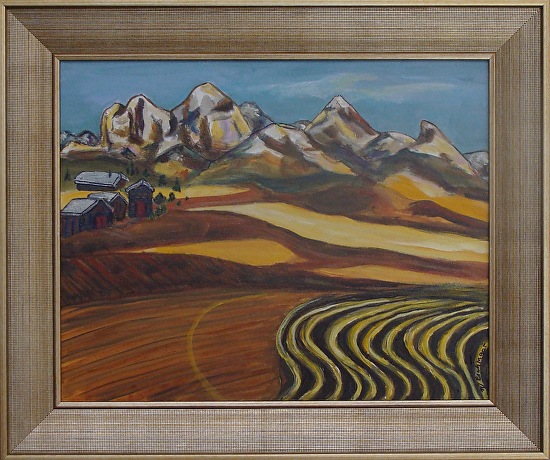Eastern Oregon Contemplative

Expansive, settling, calm, beautiful, meditative—walking in nature helps maintain perspective and mental health.
Invisible Injustice
“Be prepared. The worst is yet to come,” is the message released by scientists getting ready for the UN’s Global Conference on Health and Climate Change in November. It will be a summit like no other, for it will ask us to get ready for unprecedented changes of a magnitude that are hard to fathom. There will be suggestions for containing COVID-19, for sure. But, most of us can imagine the pandemic eventually coming to an end. It’s the climate part, asking for global collaboration that will cause most of the nervousness. It is an invisible injustice with mental health consequences.
All nations agree that everyone has the right to live in a healthy environment free of pollution, yet plans to make that happen lack agreement and human activities continue to destabilize the earth’s air, water, and climate to the point where there may be no return——certainly not in our lifetime.
Human beings have dealt with nature’s tragedies before. Pandemics, earthquakes, tidal waves have occurred throughout history, but nothing we know of has ever been on the scale that is evolving. Never have we had a crisis with such misunderstood consequences. What is acknowledge, is that it is worse than scientists originally thought and that there is no end in sight. We are being told to prepare for the long haul——one lasting 300 or 500 years or longer. How do we do that?
The visible consequences of rising temperatures——fires, floods, hurricanes, and tornadoes are easy to see. Poor air quality, degraded food, inadequate water systems, and physical illnesses plaguing our lives are recognized problems we are trying to address. Fear of mass eco-migrants fleeing homelands due to global warming is more difficult to discuss. Instead of compassion, people respond with aggression when they feel community cohesion being threatened.
Where can people go who lose homes to rising waters? Who will support them when a fire burns down their house? Where will funds come from when they are ill and lack nourishment? From you? From me? These questions plague the mental health of Americans. Dealing with an invisible injustice requires resilience that is difficult to come by. It depends on overcoming the guilt and despair that comes from feeling helpless.
Eco-anxiety, characterized by severe and debilitating worry about climate and environmental risks, has become a reason for seeking professional help. Loss of appetite, difficulty sleeping, and panic attacks are on the increase. Some psychiatrists consider anxiety an adaptive mechanism, a call to action that is an advantage for survival. They say if we don’t worry enough, we won’t take action.
The difficulty with climate change, however, is that there is no end in sight. We are on a steamroller gaining speed as the years go by. Children and marginalized communities will suffer the most, as they always do. But, all are affected, whether by conflict avoidance or by feeling powerlessness, by sensing loss and helplessness, or by feeling frustrated. The health consequences of these concerns are seen in increased injuries, asthma and cardiovascular disease, malaria, forced migration, malnutrition, drug and alcohol use, stress, mental illness, dengue fever, and other illnesses related to ecological change.
Given such dire consequences, it is important to learn how to maintain a sense of well-being. Suggestions from psychiatrists include walking and or biking rather than driving. Not only does it reduce fossil fuel consumption, but physical commuting reduces depression, anxiety, and stress. A second proposal is to spend more time in green spaces. Interacting with nature can significantly lower stress-related illnesses.
Using wind, solar, hydro, and other climate-friendly sources of energy can reduce particles and pollution in the air and make you feel good for doing your part. Practicing meditation, yoga, or mindfulness twenty to thirty minutes a day is all that is needed to lower blood pressure and help you function with a clearer head.
Another tip is to become part of a community. As you adjust to the realities of climate change, it is important to know you are not alone and that others are struggling beside you. If your economic livelihood is threatened, don’t wait until you are penniless. Change your circumstances——relocate, go back to school, try a different line of work even if it means losing money in the short run. Think of change as an adventure rather than a loss.
If forced to move, keep old cultural connections and find ways to celebrate new ones that are comforting. The internet can keep you in touch with distant friends, but it doesn’t replace having people around you with compatible interests. As human beings, we need flesh and blood companionship.
Family, friends, and networks are critical to supporting resilience. It helps to have people in our circle of acquaintances to whom we can let off steam. Children, especially, need support. They are growing up with the knowledge that the world is not as it should be—safe and secure. Many are afraid for their future. Adults can help them build confidence in their own resilience by fostering optimism and cultivating active participation and self-regulating behavior.
Lastly, it’s a good idea to boost personal preparedness by assembling short-term emergency kits. They add comfort when contemplating natural disasters. Knowing you have done your best by preparing your mind and body to accept change will help keep you calm and when facing unforeseen hurdles.
References:
Ingle, H & Mikulewicz, M Mental (2020) health and climate change: tackling invisible injustice. The Lancet Planetary Health. retrieved from https://www.thelancet.com/journals/lanplh/article/PIIS2542-5196(20)30081-4/fulltext
(2017) Mental Health and Our Changing Climate: impacts, Implications,, and Guidance.American Psychological Association. retrieved from https://www.apa.org/news/press/releases/2017/03/mental-health-climate.pdf
Art is always for sale. contact meat marilynne@eichingerfineart.com Eastern Oregon Contemplative / 21” x 25” gold frame/ acrylic on canvas/ $425.
